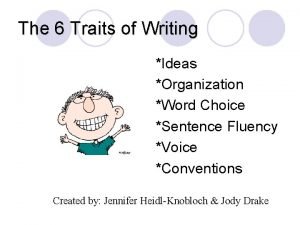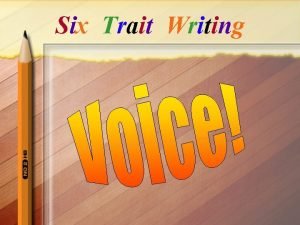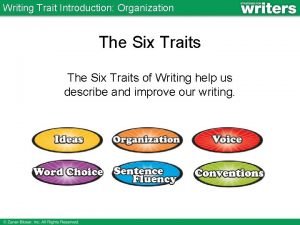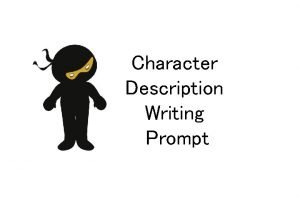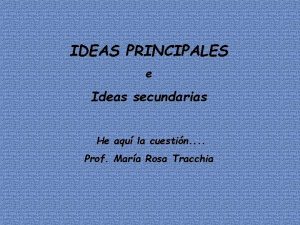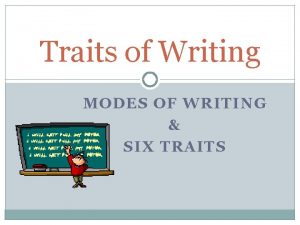The 6 Traits of Writing Trait Pairings Ideas












- Slides: 12

The 6 Traits of Writing

Trait Pairings ● Ideas and Organization ● Voice and Word Choice ● Sentence Fluency and Conventions

Ideas ● ● ● Focus on one topic; don't write about music; write about the night you saw Green Day in concert. Include details that paint a picture; use imagery to create the picture and sentence pyramids to add details. Have a strong main idea: “All about music” is a weak idea because it's too big. Get in focus: “Billie Joe Armstrong gave a killer performance at the Ford Center. ”

Organization ● ● ● Grab reader's attention. Never begin with, “This will be a story about a rock band. ” Try, “As I entered the Ford Center, I could feel the energy of the fans around me. . . ” Put ideas in order; if you find yourself writing, “Oh, I should have told you about the day I got the tickets, ” you need to put your details in a better order. Leave readers hungry for more with a strong ending. Don't write, “Well, that's all I have to say about the concert. ” Instead, write, “Despite being deaf by the end of the night. . . ”

What goes in an introduction? ● ● ● The introduction should start with a general discussion of your subject and lead to a very specific statement of your main point, or thesis. Sometimes an essay begins with a "grabber, " such as a challenging claim or surprising story to catch a reader's attention. The thesis should tell in one (or at most two) sentence(s), what your overall point or argument is, and briefly, what your main body paragraphs will be about.

Introduction Continued ● ● The introduction should be designed to attract the reader's attention and give him/her an idea of the essay's focus. You may begin with a grabber: anecdote (story that illustrates a point), dialogue , or gradual summary (broad to specific). After grabber, add a few sentences that will lead your reader from your opening to your thesis. Finish paragraph with your thesis.

The Thesis The position that a person argues and maintains through argument. Don't confuse connotations of “argument” with its denotation. Denotation: reason given in proof Connotations: ___________

Voice ● ● ● Be yourself. Your writing should sound like you, no one else. Never sound bored. Don't write, “So the concert was all right. ” Instead, write, “The concert was the most amazing night of my life, and you would not believe half the things that happened. ” Connect with your audience. Instead of writing, “Everyone should go to a concert, ” try writing, “Can you imagine knowing that you are in the same building as Billie Joe Armstrong or your favorite rocker? ”

Word Choice ● ● Avoid old tired words: nice, good, fun, stuff -try pleasant, awesome, entertaining, items/events. Use words correctly. Don't write, “I felt are bodies vibrating from the ringing of the bass guitar” ; write, “I felt our bodies. . . ”

Sentence Fluency ● ● Don't make all sentences the same length or you'll put your reader to sleep. Don't write, “Incubus was a good concert. Coldplay was a good concert. Green Day was the best concert. ” How boring! Instead, write, “Although Incubus and Coldplay were great concerts, Green Day was the most interactive. ” Vary sentence beginnings with words and phrases like Nevertheless, Although, Meanwhile, In addition to, Next, After a time, On the other hand. . . and so forth.

Sentence Fluency Continued ● Read your writing aloud to yourself when you have finished your draft. Is it smooth? Did you leave any words out? Did you repeat any words too many times?

Conventions (D. O. L. ) ● ● Check your spelling; do not rely on the spell checker of your computer; a spell checker does not know, for instance, if you meant to use the word to, too, or two. Check punctuation by reading out loud. Read slowly and with expression so you can tell when there are pauses (commas and periods), questions (question marks), strong statements (exclamation points), or direct quotations (quotation marks).
 Poem and song pairings
Poem and song pairings 6 traits of writing ideas
6 traits of writing ideas Quantitative and qualitative traits
Quantitative and qualitative traits Qualitative traits vs quantitative traits
Qualitative traits vs quantitative traits Qualitative traits vs quantitative traits
Qualitative traits vs quantitative traits Voice trait of writing
Voice trait of writing Character analysis prompts
Character analysis prompts Organization writing trait
Organization writing trait Character trait writing prompt
Character trait writing prompt Ideas have consequences bad ideas have victims
Ideas have consequences bad ideas have victims Los deseos ridículos preguntas y respuestas
Los deseos ridículos preguntas y respuestas Hình ảnh bộ gõ cơ thể búng tay
Hình ảnh bộ gõ cơ thể búng tay Frameset trong html5
Frameset trong html5

